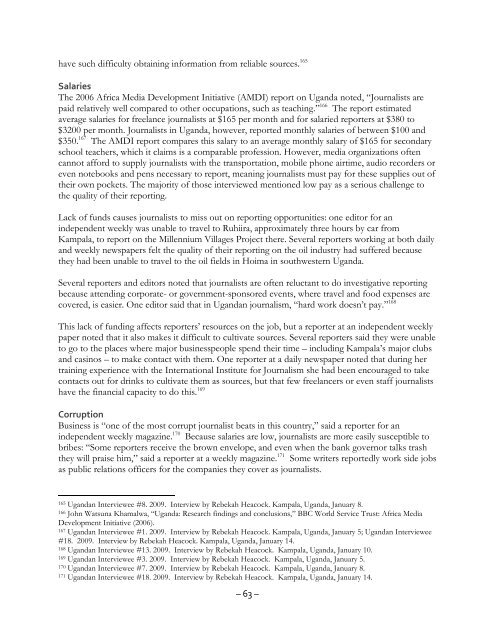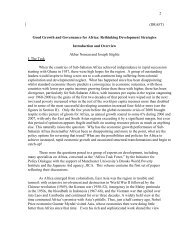Limited ResourcesUganda has made serious ef<strong>for</strong>ts to correct its current power shortage, including a recent pledge touse its own resources to construct a $1.2 billion dam on the Nile River. However, the electricitypenetration rate is still low, and local manufacturers estimate that power and fuel shortages willcause a 5 percent drop in GDP in 2009. 159 Load-shedding, or a controlled rolling blackout, iscommon in Kampala, and is expected to increase this year as a result of the energy crisis. 160Uganda’s Internet penetration rate grew from 0.2 percent to 2.5 percent between 2000 and 2006. 161Most Ugandans who can af<strong>for</strong>d to use the Internet go to public cafés, which are prevalent inKampala. Access generally costs between 1500 and 6000 Ugandan shillings ($0.70 to $2.78) perhour. 162 Large businesses, including most major media organizations, are able to offer theiremployees regular Internet access. Still, expensive, unreliable bandwidth makes browsing slow.Multiple journalists expressed frustration at either lack of access to Internet or a lack of time to fullyutilize online resources.While fewer than one percent of Ugandans have landline telephones, approximately 80 percent ofthe population has access to a mobile phone. 163Lack of Access to In<strong>for</strong>mationNearly everyone interviewed mentioned lack of access to in<strong>for</strong>mation as a major obstacle to his orher work. The Access to In<strong>for</strong>mation Act of 2005 and Article 41 of the 1995 Constitution ofUganda both guarantee citizens the “right of access to in<strong>for</strong>mation and records in the possession ofthe state or any public body, except where the release of the in<strong>for</strong>mation is likely to prejudice thesecurity or sovereignty of the state or interfere with the right to the privacy of any other person,”but many of those interviewed reported delays of up to a year when requesting access togovernment records supposedly covered by the law. 164 The biggest case of this recently has beenwith regard to the profit sharing agreements between the government and the oil companiesworking in southwestern Uganda. These contracts are technically public in<strong>for</strong>mation, but journalistsat nearly every media organization our team member visited said they had been trying to get copiesof the agreements <strong>for</strong> four months without success.Obtaining in<strong>for</strong>mation from businesses is also difficult. Multiple in<strong>for</strong>mants complained thatbusiness journalism “is like public relations” in Uganda, as companies are willing to give out so littlein<strong>for</strong>mation that many papers simply republish press releases. In<strong>for</strong>mants reported that businessesoften claim in<strong>for</strong>mation is classified or too sensitive to release, and one business editor at a majorpaper complained that his reporters often resort to “conjecture and extrapolation” because they159 “Fuel, power shortage to cost Uganda economy 400 mln dollars,” China View, January 7, 2009,http://news.xinhuanet.com/english/2009-01/07/content_10620000.htm.160 Ismail Musa Ladu, “Load-shedding to resume, says Eskom,” Daily Monitor, January 10, 2009,http://www.monitor.co.ug/artman/publish/news/Load-shedding_to_resume_says_Eskom_77997.shtml.161 World Bank, “ICT at a Glance: Uganda,”http://web.worldbank.org/WBSITE/EXTERNAL/DATASTATISTICS/0,,contentMDK:20459133~menuPK:1192714~pagePK:64133150~piPK:64133175~theSitePK:239419,00.html.162 Samuel Gitta and J.R. Ikoja-Odongo, “The impact of cybercafés on in<strong>for</strong>mation services in Uganda,” First Monday 8,no. 4 (2003), http://www.firstmonday.org/ISSUES/issue8_4/gitta/index.html.163 MobileActive, “Uganda,” http://mobileactive.org/countries/Uganda.164 Ugandan Access to In<strong>for</strong>mation Act, 2005, Section 5.1, July 19, 2005.– 62 –
have such difficulty obtaining in<strong>for</strong>mation from reliable sources. 165SalariesThe 2006 Africa Media Development <strong>Initiative</strong> (AMDI) report on Uganda noted, “Journalists arepaid relatively well compared to other occupations, such as teaching.” 166 The report estimatedaverage salaries <strong>for</strong> freelance journalists at $165 per month and <strong>for</strong> salaried reporters at $380 to$3200 per month. Journalists in Uganda, however, reported monthly salaries of between $100 and$350. 167 The AMDI report compares this salary to an average monthly salary of $165 <strong>for</strong> secondaryschool teachers, which it claims is a comparable profession. However, media organizations oftencannot af<strong>for</strong>d to supply journalists with the transportation, mobile phone airtime, audio recorders oreven notebooks and pens necessary to report, meaning journalists must pay <strong>for</strong> these supplies out oftheir own pockets. The majority of those interviewed mentioned low pay as a serious challenge tothe quality of their reporting.Lack of funds causes journalists to miss out on reporting opportunities: one editor <strong>for</strong> anindependent weekly was unable to travel to Ruhiira, approximately three hours by car fromKampala, to report on the Millennium Villages Project there. Several reporters working at both dailyand weekly newspapers felt the quality of their reporting on the oil industry had suffered becausethey had been unable to travel to the oil fields in Hoima in southwestern Uganda.Several reporters and editors noted that journalists are often reluctant to do investigative reportingbecause attending corporate- or government-sponsored events, where travel and food expenses arecovered, is easier. One editor said that in Ugandan journalism, “hard work doesn’t pay.” 168This lack of funding affects reporters’ resources on the job, but a reporter at an independent weeklypaper noted that it also makes it difficult to cultivate sources. Several reporters said they were unableto go to the places where major businesspeople spend their time – including Kampala’s major clubsand casinos – to make contact with them. One reporter at a daily newspaper noted that during hertraining experience with the International Institute <strong>for</strong> Journalism she had been encouraged to takecontacts out <strong>for</strong> drinks to cultivate them as sources, but that few freelancers or even staff journalistshave the financial capacity to do this. 169CorruptionBusiness is “one of the most corrupt journalist beats in this country,” said a reporter <strong>for</strong> anindependent weekly magazine. 170 Because salaries are low, journalists are more easily susceptible tobribes: “Some reporters receive the brown envelope, and even when the bank governor talks trashthey will praise him,” said a reporter at a weekly magazine. 171 Some writers reportedly work side jobsas public relations officers <strong>for</strong> the companies they cover as journalists.165 Ugandan Interviewee #8. 2009. Interview by Rebekah Heacock. Kampala, Uganda, January 8.166 John Watsuna Khamalwa, “Uganda: Research findings and conclusions,” BBC World Service Trust: Africa MediaDevelopment <strong>Initiative</strong> (2006).167 Ugandan Interviewee #1. 2009. Interview by Rebekah Heacock. Kampala, Uganda, January 5; Ugandan Interviewee#18. 2009. Interview by Rebekah Heacock. Kampala, Uganda, January 14.168 Ugandan Interviewee #13. 2009. Interview by Rebekah Heacock. Kampala, Uganda, January 10.169 Ugandan Interviewee #3. 2009. Interview by Rebekah Heacock. Kampala, Uganda, January 5.170 Ugandan Interviewee #7. 2009. Interview by Rebekah Heacock. Kampala, Uganda, January 8.171 Ugandan Interviewee #18. 2009. Interview by Rebekah Heacock. Kampala, Uganda, January 14.– 63 –
- Page 1 and 2:
THEREWILLBE INKA study of journalis
- Page 3 and 4:
AcknowledgementsThis paper has bene
- Page 7 and 8:
Executive SummaryPurpose of the Rep
- Page 9 and 10:
journalists in these countries that
- Page 11 and 12:
Existing International Training Opp
- Page 13 and 14:
• Consumer Affairs and Informatio
- Page 15 and 16:
Background 3Of the three countries
- Page 17 and 18: pervasive conflict in the Niger Del
- Page 19 and 20: 3) Crises or disruptions, where som
- Page 21 and 22: Low pay and low regardOne of the mo
- Page 23 and 24: Even in cases where working journal
- Page 25 and 26: But while some reporters think FOIB
- Page 27 and 28: When asked how much the media could
- Page 29 and 30: the effects of these challenges for
- Page 31 and 32: detailed analysis of the opportunit
- Page 33 and 34: journalist said he has, however,
- Page 35 and 36: completely make use of some of the
- Page 37 and 38: money. Their knowledge of what medi
- Page 39 and 40: Notes on conducting research in Nig
- Page 41 and 42: Ghana- 35 -
- Page 43 and 44: evenues each year,” 106 which wou
- Page 45 and 46: entertainment news, scandals, and p
- Page 47 and 48: The rise of business-focused journa
- Page 49 and 50: coverage of the oil industry is als
- Page 51 and 52: needed supplementary income to cash
- Page 53 and 54: as supporting one political party o
- Page 55 and 56: Numerous journalists recounted how
- Page 57 and 58: Training programs available to busi
- Page 59 and 60: Amos Safo, editor-in-chief at the p
- Page 61 and 62: Notes on conducting research in Gha
- Page 63 and 64: Background 136Literacy and Educatio
- Page 65 and 66: “sufficient information” about
- Page 67: or criminal charges for content the
- Page 71 and 72: The majority of those interviewed b
- Page 73 and 74: commitment to their profession and
- Page 75 and 76: Notes on Conducting Research in Uga
- Page 77 and 78: Recommendations for Revenue Watch I
- Page 79 and 80: people who have no journalism backg
- Page 81 and 82: analyzes business,” he said, “e
- Page 83 and 84: A journalist with The Punch said,
- Page 85 and 86: The Media Foundation for West Afric
- Page 87 and 88: Length of TrainingRoughly three-qua
- Page 89 and 90: industries, for instance, ought to
- Page 91 and 92: otherwise being published in the pr
- Page 93 and 94: Non-Training Recommendations for Ug
- Page 95 and 96: Appendix A: NigeriaPotential Partne
- Page 97 and 98: journalists. Biakolo is very profes
- Page 99 and 100: Television Stations• Nigerian Tel
- Page 101 and 102: have two to four month professional
- Page 103 and 104: City: AccraTelephone: +233 (021) 22
- Page 105 and 106: Fax: +256 414 255 495E-mail: umdf@a
- Page 107 and 108: • What do you think are the most
- Page 109 and 110: Appendix E: Survey Questions1. Name
- Page 111 and 112: 18. How effective were the teaching
- Page 113 and 114: 28. What are the most important cha
- Page 115 and 116: 1. Journalists by Country2. How wou
- Page 117 and 118: 5. How often do you travel out of t
- Page 119 and 120:
9. Which organization(s) sponsored
- Page 121:
12. After completing the training(s














